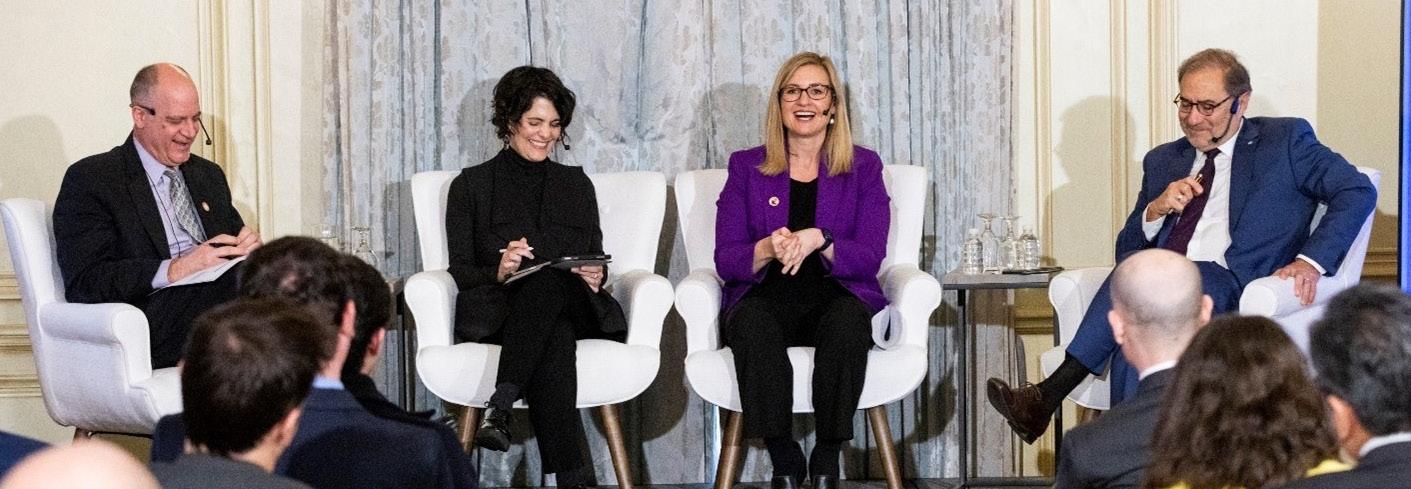
3 minute read
INTRODUCTION FROM OUR CEO
American success and alliances worldwide are intrinsically linked to the policies and actions undertaken within the United States. Recognizing this connection, there is growing need to expand the responsibility for international affairs beyond Washington and the federal government.
As cities and states emerge as influential global actors in diplomacy, their evolving impact on a wide range of areas, including international trade, business development, climate change migration, and global health, becomes increasingly apparent.
One key attribute that sets cities and states apart is their consistency and proximity to their consistents - qualities valued by corporations and governments globally. When the foreign policy of the federal government may undergo significant changes every election year, American and foreign cities can be reliable partners in trade and various other issues.
Through our longstanding partnership with the U.S. State Department on the International Visitor Leadership Program (IVLP), Meridian has been deeply involved in subnational diplomacy. Over the course of six decades, we have facilitated meaningful exchanges among thousands of public officials and community leaders from around the world, connecting with them with mayors, governors, city council members, school board members and more.
Educating foreign diplomats on the importance of engaging with American cities and states has been a vital objective of the Meridian Center for Diplomatic Engagement. We partnered with the National Governors Association for a conversation on how engaging at the state level is key to success of diplomats and the private sector to the meetings with the Governors of Utah, Oklahoma, Virginia, and Arkansas, Meridian is committed to promoting state and city leaders as a resource for the diplomatic corps in Washington. In 2023 alone, we co-hosted a program with Brookings on the rise of subnational diplomacy, featuring esteemed guests such as Argentine Ambassador Jorge Arguello, Phoenix Mayor Kate Gallego, and Ambassador Nina Hachigian, the State Department's inaugural Special Representative for City and State Diplomacy. This was followed by the 2023 Diplomacy Forum which included thought-provoking panel discussions around developing international affairs strategies for states and municipalities, the rise and growing power of city networks, and constructing next-generation cities to address global challenges.
By facilitating the sharing of knowledge and building networks, Meridian aims to transcend traditional boundaries of the public and private sectors within cities and regions, leading to unprecedented success. The frontier of diplomacy continues to evolve, and Meridian remains committed to shaping it's future, working hand in hand with leaders to navigate the complexities of the 21st century statecraft required for effective global collaboration.
THE RISE OF SUBNATIONAL DIPLOMACY: TOP TAKEAWEAYS
WHAT TO EXPECT FROM THE NEW STATE DEPARTMENT OFFICE FOR CITY & STATE DIPLOMACY
Ambassador Hachigian outlined three major goals of the new office: to serve as a conduit for states and cities to obtain the “tangible benefits of foreign policy”; encourage U.S. local leaders to engage internationally; and to encourage the State Department to engage subnational actors across the U.S. and around the world. Since very few U.S. cities and states have offices dedicated to international engagement, the Office for Subnational Diplomacy will provide many of the resources necessary to ensure that U.S. local leaders are able to engage on an international level. This includes advice on protocol and engagement, as well as focus on activating (or re-activating) fellowships, outreach through the Office of Foreign Missions, and State department alumni to supply additional international capacity. Fortunately, the new Office has been received enthusiastically by mayors, governors, and their existing representative networks, as well as other parts of the State Department and Administration.
GLOBAL INTERACTION IN THE BEST INTERESTS OF CITIES AND STATES/ DOLLARS AND CENTS OF GLOBAL ENGAGEMENT
As the economy becomes increasingly globalized, cities and states that are looking through an international lens stand to benefit the most. In Phoenix, foreign direct investment has diversified the economy and brought skilled positions and job training to the city. In Argentina, foreign direct investment in provinces has offered such great opportunities for the country that Argentina is actively seeking to direct foreign investment to the country through governors’ offices. Ambassador Argüello discussed the Embassy of Argentina's “Federal Agenda Program,” a program in which the embassy works with the country's 23 provinces, in addition to the city of Buenos Aires, to attract foreign investment opportunities. As Ambassador Argüello put it, each province's natural resources and regulatory environment represent a unique investment opportunity for the private sector.However, cities and states are not the only ones that benefit from this global interaction. Ambassador Hachigian emphasized this while discussing the soft power potential that subnational leaders offer to their countries.





